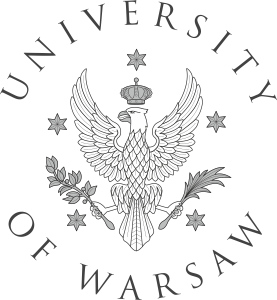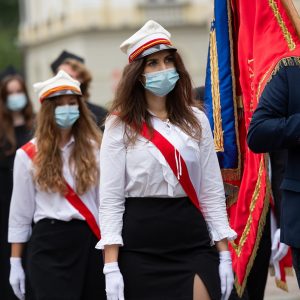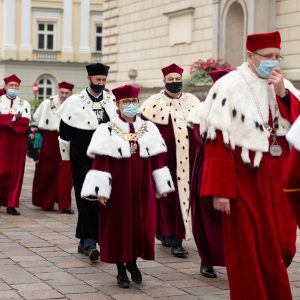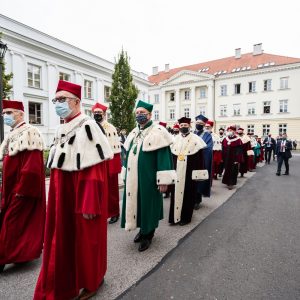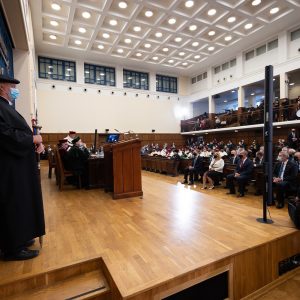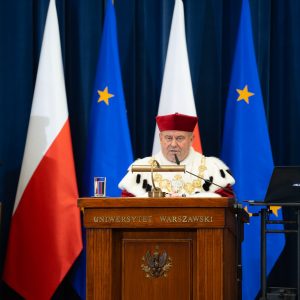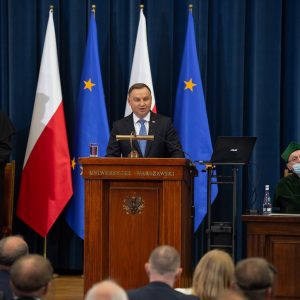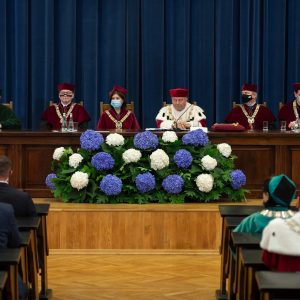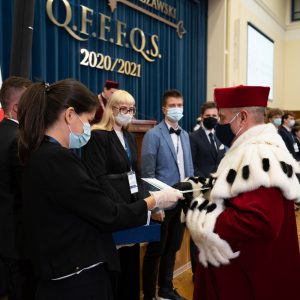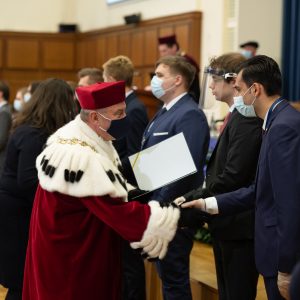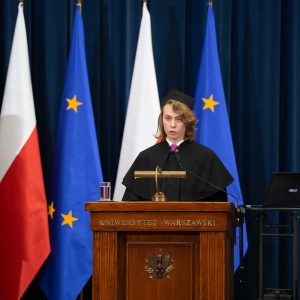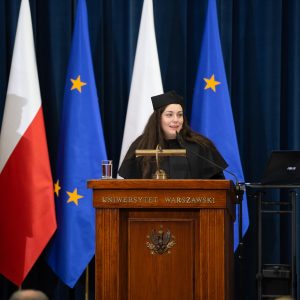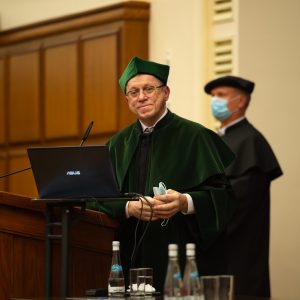Change of the teaching mode in the winter semester 2020/2021
13 października 2020The increase in the incidence of disease in Poland, overlapping classes for some students, the problem of ensuring epidemic safety for students listening to remote lectures at the Department of Chemistry, the expected increase in the absenteeism of students and academic teachers were the basis for the decision to increase the number of remote classes.
In the winter semester of the academic year 2020/2021 from 15.10.20 until further notice, theoretical classes will be held in asynchronous remote mode or synchronous remote mode with simultaneous recording of classes. All practical classes (laboratories) will be held in contact or in contact with remote elements.
Graduate student Bioinformatics/Computational Biology
10 października 2020Laboratory of Computational Biology seeks candidates for the graduate student in Bioinformatics/Computational Biology at the Biological and Chemical Research Center (Faculty of Chemistry), University of Warsaw. Project: OPUS 2019/33/B/NZ2/02100 „Development of a new protein-protein docking method based on the flexible docking of short peptide fragments” – financed by the National Science Centre. Deadline for applications: 23 October 2020. For more info see >> pdf
Postdoc Bioinformatics/Computational Biology
Laboratory of Computational Biology seeks candidates for the postdoc position in Bioinformatics/Computational Biology at the Biological and Chemical Research Center (Faculty of Chemistry), University of Warsaw. Project: OPUS 2019/33/B/NZ2/02100 „Development of a new protein-protein docking method based on the flexible docking of short peptide fragments” – financed by the National Science Centre. Deadline for applications: 31 October 2020. For more info see >> pdf
An announcement for adjunct position
08 października 2020Position of adjunct (group of research workers) in the project entitled „Phase transitions in minerals induced by pressure and studied by experimental charge densities – feasibility studies” financed by National Science Centre (NCN) is open for application. (see: https://crystal.chem.uw.edu.pl/). Project leader: Prof. dr hab. Krzysztof Woźniak. Deadline for applications: 1 November 2020. For more info see >> pdf
An announcement for post-doctoral research position
07 października 2020Position of post-doc (a group of science positions) (pol. adiunkt w grupie pracowników badawczych) in the Sonata Bis 7 project entitled „Alpha-helicomimetic foldamers – synthesis, self-assembly and molecular recognition” financed by National Science Centre, Poland is open for application. Project leader: dr hab. Karolina Pułka-Ziach. Deadline for applications: 6 November 2020. For more info see >> pdf
BUW opens up
05 października 2020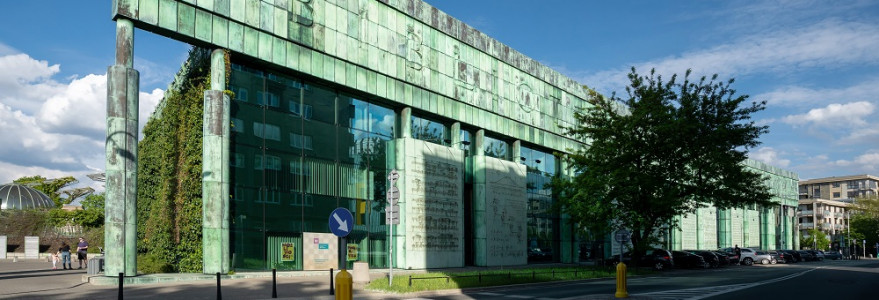
As of 15th October, the University of Warsaw Library (BUW) will resume its operation. BUW users need to follow sanitary regulations.
When using the University of Warsaw Library, readers will need to put on face masks or face shields, use hand sanitizer before entering the building and at the reader’s service stations, and keep a safe distance of at least 1.5 m from other people. Also, BUW recommends wearing disposable gloves.
The maximum number of users who will be in the library at the same time is 300. Only users holding a valid library card will be allowed to enter the building. The registration point will be located in the passage on the ground floor, on the left side of the entrance from Lipowa Street.
As of 15th October, the following services will available to members of the UW community, e.g.:
- Borrowing and returning books,
- Interlibrary loan,
- Requesting scans,
- Complaints,
- Settlements with BUW.
Training for students and other users, conferences, library tours, external meetings, visits for groups of more than five people, and cultural events will not be provided. Find out more >>
From 12th to 14th October, the University of Warsaw Library will be closed. In this period, BUW will not charge for overdue books. More information >>
Opening hours:
- Information Desk: (phone +48 22 55 25 178/179, e-mail: informacja.buw@uw.edu.pl or askalibrary.buw@uw.edu.pl), Monday – Friday 9 am – 9 pm (Only one person may be present at the service station);
- Registration (ground floor, on the left side at the entrance from Lipowa Street), Monday – Friday 9 am – 8 pm (Only one person may be present at the service station);
- Circulation Desk and SelfCheck kiosks (level 1), Monday – Friday 9 am – 9 pm (Only one person may be present at the service station);
- Return box – 24/7;
- Reading Room (level 2), Monday – Friday 9 am – 9 pm (Only one person may be present at the service station);
- Special Collection Departments – individually arranged, during office hours.
Detailed information is available on the University of Warsaw Library website >>
Source: www.en.uw.edu.pl
Workshops on the Polish Culture and Intercultural Communication
02 października 2020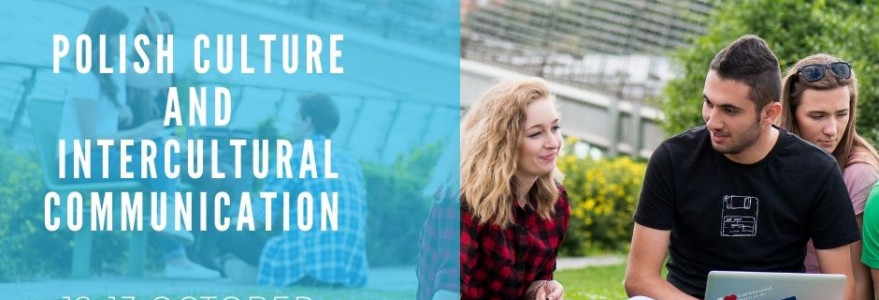
On 12th and 13th October, Welcome Point organises “Polish Culture and Intercultural Communication” online workshops for long term students. One can register by 5th October.
How cultural differences influence our daily communication? How to communicate in a multicultural group? How to get used to living and studying abroad? International students can learn about these questions on WP workshops. The WP team members will also provide participants with information on Poland and Warsaw.
The workshops will be held online and will last two days, from 10 am to 1:30 pm.
Who can attend?
- Long term students of 2nd and 3rd year of the first cycle (BA)
- Long term students of the second cycle (MA)
- Long term students of 4th and 5th year of uniform master level studies
To register, please fill in a form >>
Participation is free of charge. Application deadline: 5th October.
More information on the Welcome Point website.
Source: www.en.uw.edu.pl
Inauguration at UW
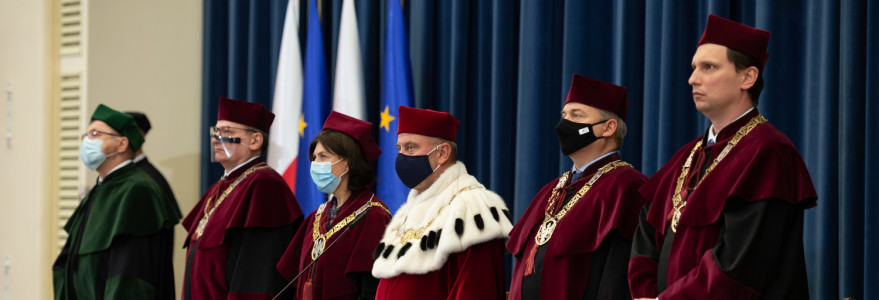
1st October marked the beginning of the academic year 2020/20201 at the University of Warsaw. Professor Alojzy Z. Nowak has opened the solemn ceremony that was held at 2 pm in the Auditorium Maximum building.
During the ceremony, there was the following order:
- Singing the national anthem and “Ode to Joy”
- Prof. Alojzy Nowak, the UW Rector, delivered a speech
- Matriculation
- Speeches of the representative of students and doctoral candidates
- First academic lecture, on brain surgery, will be delivered by Prof. Mirosław Ząbek from the Centre of Postgraduate Medical Education
This year, Poland’s President Andrzej Duda attended the ceremony.
The inauguration of the academic year 2020/2021 bagan on 1st October at 2 pm in the Auditorium Maximum building. All sanitary regulations aim to prevent the spread of SARS-CoV-2 were followed. All participants were asked to wear protective face masks.
Due to the limited number of places, resulted from the epidemiological situation, the organisers reserved the right to admit guests to the Auditorium Maximum building who had previously received invitations.
The event was broadcast and translated into English>>
Although the academic year began on 1st October, students will start their classes on 15th October.
Source: www.en.uw.edu.pl
Prof. Julian Henn – a new visiting professor at our Department
01 października 2020Since the 1st of Oct. 2020, a visiting professor Julian Henn is joining our Department. Julian will be staying in prof. Krzysztof Woźniak’s group. This visiting professorship is possible thanks to funds offered within the Integrated Actions Program for the Development of the University of Warsaw, co-financed by the European Social Fund under the OP KED, path 3.5. Prof. Henn works in the field of systematic errors in least squares applications and quality indicators for crystallographic diffraction data. Some of us may remember his excellent lecture during European Charge Density Meeting, organised at CENT in 2016 and his lectures and classes during his previous stay at our department (in 2016).
Julian got his PhD in the Quantum Chemistry group of Professor Bernd Engels, Bayerische Julius-Maximilians University Würzburg, defending his thesis (2004): „The electron density: a bridge between exact quantum mechanics and fuzzy chemical concepts” (Summa cum laude), online publication at:
http://opus.bibliothek.uni-wuerzburg.de/opus/volltexte/2004/900/
Earlier he studied theoretical physics and philosophy (philosophy of science in particular) as subsidiary subject.
Julian has published ca. 40 papers so far in the leading chemical and crystallographic journals such as, for example: JACS(3), Angewandte Chem.(7), Chem. Eur. J., J. Phys. Chem. (6), J. Comp. Chem., Phys. Rev. Lett., Chem. Commun. (3), Acta Cryst. A (9), Inorg. Chem., Crystallographic Reviews, Acta Cryst. B, etc.
He worked as Postdoctoral Research Fellow in the group of Professor Dietmar Stalke, Institute of Inorganic Chemistry, Georg-August University Göttingen, Germany (years 2006-2010). In years 2005-2006, Julian worked as Feodor Lynen Research Fellow (12 months) of the German Alexander von Humboldt Foundation at the Theoretical Quantum Optics of Professor U. Leonhardt (University of St Andrews, Scotland, UK) and just after PhD he joined a Research Fellow Professor Bernd Engels at the Institute of Organic Chemistry, Bayerische Julius-Maximilians University Würzburg.
In 2016 Prof. Henn also joined my group (Prof. Krzysztof Wozniak) for 3 months at our Department (Department of Chemistry, University of Warsaw).
Now since the 1st/10/2020 Julian Henn is joining us again for 5 months as visiting professor.
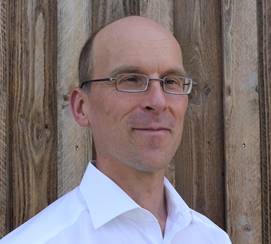
Julian will present two series of lectures (of course all in English):
Fit Data Evaluation (with applications in crystallography) – ZIP
and Tutorial on Mathematics (bachelor level) – ZIP
This teaching is offered within the Integrated Actions Program for the Development of the University of Warsaw, co-financed by the European Social Fund under the OP KED, path 3.5. (ZIP).
The first series of lectures, Fit Data Evaluation (with applications in crystallography), is focused on fitting a model to data. This is performed in all natural sciences; it is an indispensable tool for model building, model evaluation and hypotheses testing. With modern linear algebra and statistics packages as implemented in R, Mathematica, or MatLab, it is often not the problem to obtain a fit, however, the interpretation of the fit becomes more important. In this course, the standard interpretation tools are reviewed, their abilities and limitations are discussed and new concepts are introduced (for a review see Crystallography Reviews, 2019, 25(2): 83-156) to overcome the limitations. It is pointed out, which tacitly assumed (and often not met) conditions are necessary for meaningful applications of these descriptors and how to test these assumptions as well as how to overcome limitations. Although the example applications are mainly from crystallographic data sets, most concepts can be applied immediately to other research areas, too. Therefore, this course is of interest for all students, PhD students and even scientists, who use least-squares fitting (or maximum entropy fitting) on datasets with small and large observed entities.
The course is available to graduates and post-graduates (and scientists) of all studies dealing with experiment and analysis of measured data. And this course is also for all those who work in the field of broadly understood crystallography.
Here are the topics which will be presented:
Why fit quality evaluation? Chances and limits of fit quality evaluation. Data descriptors and data quality descriptors. Conscious and subconscious choices. Error affine and error aversive atmosphere.
Least Squares refinement. History, method, maths. Linear least squares and non-linear, iterative least squares, maximum likelihood estimators
Statistical Descriptors. Mean, Variance, linear correlation, rank correlation, Goodness of Fit (GoF), Chi Square and more
Standard Metrics for crystallographic data and new complements:
GoF and agreement factors,
the significance of the GoF, predicted agreement factors, correlation coefficients
New Approaches.
alternative Goodness of Fit, Meta residual values, Bayesian Conditional probability plots (BayCoN) and associated Chi-Square values, Fractal Dimension plots, etc
Applications:
Case studies, applications to 127 data sets, individual published data sets
Hands-on tutorial
The second course, Tutorial on Mathematics, is a bachelor level course in Mathematics.
Mathematics is of great importance in all natural sciences. It is therefore a good idea to continuously develop and train mathematical skills and a profound understanding of mathematical concepts. The course aims at a deepening of the known mathematical concepts and to improve the skills in their application.
Each lesson comprises background knowledge, definitions, examples and exercises, such that the learned lessons are implemented immediately and questions can be answered in place. 60 Minutes are given to lecturing, 30 minutes to exercises. The course is open for all students chemistry, medical chemistry and nanoscience after their first year of studies. This could be an interesting alternative to the courses in Polish.
The main topics covered in the course:
Introduction, Basic notation and concepts
Polynomials
Vectors
Matrices
System of linear equations
Vector spaces
Eigenvalues
Differential equations
Complex numbers
Continuity
Series and limits
Differentiability
Power series
Dear Julian,
Welcome to Warsaw,
Welcome to our University.
Prof. Krzysztof Woźniak

